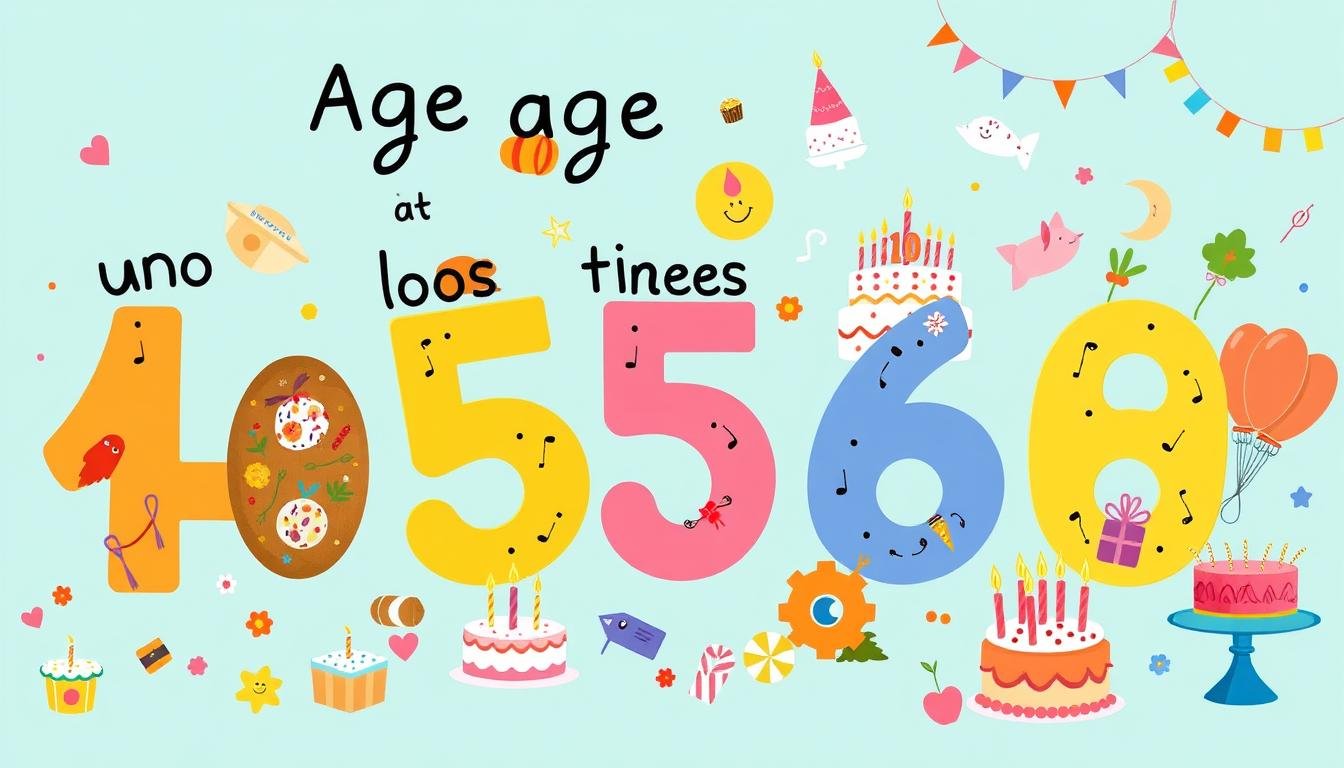A vibrant classroom scene with diverse students engaged in learning, featuring visual elements related to age and Spanish language phrases, such as colourful posters displaying numbers and age-related vocabulary, an interactive whiteboard with illustrated questions about age, and students practising in pairs with notebooks and pens, surrounded by cultural decorations that reflect Spanish-speaking countries.
Spanish age questions open a world of cultural communication. These phrases help connect with Spanish speakers more effectively.
Asking about age is an essential skill for Spanish learners. It makes conversations smoother when travelling or chatting with Spanish-speaking friends.
This guide covers basic Spanish phrases for discussing age. You’ll learn simple ways to ask and answer age-related questions.
With practice, these phrases will become second nature. They’ll help you communicate more confidently in Spanish.
Let’s explore Spanish-age conversations! You’ll discover more than just textbook translations.
Understanding Basic Spanish Questions
Spanish question words are key for good talks. They help you ask essential things and chat better.
Common Spanish question words include “¿Qué?” (What?), “¿Quién?” (Who?), and “¿Dónde?” (Where?). “¿Cuándo?” (When?) is also helpful to know.
To ask someone’s age in Spanish, say, “¿Cuántos años tienes?” This is a polite way to ask.
Spanish questions are different from English ones. Learn how they work to talk better.
The upside-down question mark (¿) shows you’re asking something. It helps listeners know what’s coming.
Practice these words to feel more sure when speaking Spanish. Please start with the basic ones and their meanings.
Use them in easy talks to get better at Spanish. This will help you connect with Spanish speakers.
Key Vocabulary for Age-Related Conversations
A colourful and engaging illustration depicting various numbers associated with age in Spanish, featuring large, bold numerals like “uno,” “dos,” “tres,” up to “cien,” surrounded by diverse cultural elements related to age celebrations, such as birthday cakes, candles, and festive decorations. The background should reflect a vibrant, cheerful atmosphere that symbolizes the joy of ageing and learning. Use bright colours to emphasize the importance of these numbers in a celebratory context.
Learning Spanish numbers is key for smooth conversations about age. Start with basic terms from uno (one) to cien (hundred).
“Tengo… años” (I am… years old) is essential for discussing birthdays. Young learners can practice saying their age confidently.
Spanish birthday phrases add cultural depth to talks. “Feliz cumpleaños” (Happy birthday) is a must-know expression.
Age-related terms help build language skills. Spanish has different words for age ranges.
“Niño” (child), “adolescence” (teenager), and “adult” (adult) describe age groups well. Listen to native speakers use these words in Spanish media.
Language apps offer great resources for mastering these vital communication skills. Practice with these tools to improve your Spanish.
Making Conversations About Age
When talking about age in Spanish, cultural care and practice are needed. Spanish examples show differences from English talks about age.
In Spanish cultures, age questions can be more direct. People might ask “¿Cuántos años tienes?” (How old are you?).
Young people and close friends often share age info easily. With older adults or work contacts, it’s more careful.
It’s polite to avoid asking too much about age. Some give a range instead of an exact number.
Someone might say, “Tengo treinta y tantos” (I’m in my thirties), which is nicer than giving their exact age.
Remember, age talks change by place and setting. Some countries talk about age freely.
In others, age is more private. Practice helps you get better at these chats.
Watch Spanish movies and talk with native speakers. This will help you understand age talk better.
Tips for Practicing Your Spanish Skills
Daily practice is key to mastering Spanish. Try listening to podcasts or watching movies in Spanish.
Use language learning apps to improve your skills. Create a routine that includes these activities.
Good pronunciation is vital for authentic Spanish communication. Practice speaking with native Spanish speakers through online platforms.
Mimic the rhythm of native speakers to improve your accent. This will also help your understanding of Spanish.
Make learning Spanish fun and engaging—set goals like learning five new words each week.
Use flashcards and mobile apps to keep learning interesting. Interactive online resources can also help you learn.
Create a Spanish environment at home. Change your device language to Spanish.
Follow Spanish social media accounts. Join local Spanish conversation groups to practice speaking.
Practice Spanish for 15-30 minutes every day. Don’t worry about making mistakes when you speak.
Every conversation helps you improve your skills. Keep talking to get closer to fluency in Spanish.
Additional Resources for Spanish Learners
Spanish learning apps offer fun ways to boost your skills. Duolingo and Babbel have great lessons for words and talking.
Tandem and HelloTalk let you chat with native Spanish speakers. You can ask questions and learn about different cultures.
Spanish textbooks are still helpful for learning grammar and words. McGraw-Hill and Pearson make good books that explain things well.
Try using apps, talking to people, and reading books. This mix will help you learn Spanish faster.
Practice often with different methods. Your Spanish will improve quickly this way.
FAQ
How do you ask someone’s age in Spanish?
In Spanish, you ask “¿Cuántos años tienes?” This means, “How many years do you have?”
It’s the most common way to ask someone’s age.
What is the formal way to ask someone’s age in Spanish?
The polite form is “¿Cuántos años tiene usted?” Use this with strangers or elders.
It’s also suitable for work settings.
How do you respond to an age question in Spanish?
Say “Tengo [number] años.” This means “I am [number] years old.”
For example, “Tengo 25 años” means “I am 25 years old.”
Are there any cultural considerations when asking about age in Spanish-speaking countries?
Asking about age is less taboo in Spanish-speaking cultures. But be respectful.
Think about if it’s okay to ask before you do.
How do you say birthday in Spanish?
“Cumpleaños” is the Spanish word for birthday. Say “Feliz cumpleaños” to wish someone well.
What are the numbers used for ages in Spanish?
Spanish uses the same numbers as English for ages. They’re just said differently.
For example, 25 is “veinticinco”, and 30 is “treinta”.
How do you ask a child’s age in Spanish?
Ask a child “¿Cuántos años tienes?” using the informal “tú” form.
To ask a parent, say “¿Cuántos años tiene tu hijo/a?”
Are there any unique age-related expressions in Spanish?
Yes! Spanish has fun age expressions. “Estar en los treinta” means “to be in one’s thirties.”
you may also read : How Long Is 19 Months: Period Guide



